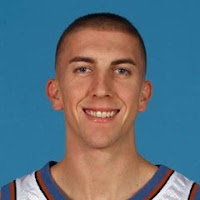Sunday, October 4, 2009
The Battle at SF for Portland
The battle for playing time at small forward for the Portland Trail Blazers might be one of the most intriguing positional struggles in the NBA this year. As the 09-10 season kicks off, the Blazers have a stable of young, worthy players vying for the starting position at SF, but only a limited amount of PT to hand out. The following is a detailed breakdown of the weakness and strengths of each player, as well as a prediction as to who emerges at SF out of this select and talented group.
Nicolas Batum:
Going into last season, nobody outside of Portland really knew anything about this rookie other than that he was only 19 years old, he was from France, and that he would be battling for playing time at an already deep position for the Blazers. However, Batum played admirably when given the opportunity to take the court last season, securing his status as the best on-ball defender on the Blazers while showing a surprisingly good shooting range and the ability to take the ball to the basket with a vengeance when necessary. Batum got 75 starts at SF last season, and came through with averages of 5.3 pts, 2.8 rebs, .5 blks and .6 stls per game in only 18 minutes of playing time per contest. While Batum’s outstanding defense surely makes his value in reality eclipse his prospects as a fantasy powerhouse, if Batum gets the majority of the minutes at SF for this team, his offense will improve with time. Batum’s defense is already top-tier level, and his offense game resembles an unpolished Tayshaun Prince.
Batum’s weaknesses at the moment are that his offensive game is very stationary and that he looks uncomfortable handling the ball. Batum also hasn’t been successful in using his aggressive drives to create opportunities for his teammates, as evidenced by his measly 0.9 apg average. But while Batum has his deficiencies, he is a promising young player with lots of room to improve. Looking towards the future, he definitely has the most room to improve of any player in this group.
Rudy Fernandez:
Like Batum, Rudy Fernandez emerged as a major contributor for the Blazers during his 08-09 rookie campaign. While Coach Nate McMillan preferred to play Rudy with the Blazers second unit off the bench, Fernandez put up impressive averages of 10.4 pts, 2.7 rebs, 2.0 assists and 2.0 3PM per game. His 159 3PM broke the previous record for 3 pointers made by a rookie, previously held by Kerry Kittles from his 96-97 campaign.
Those numbers are impressive for a first year 6th man, but the reality of the situation is that Rudy was utilized mostly as a 3-point specialist for Portland last season. While Rudy surely showed glimpses of his breathtaking athleticism and play-making abilities during the season, he often floated around the perimeter on offense too much instead of using his slashing abilities to get to the hoop, create for teammates or get to the free throw line (he shot 84% last season when he got there). This season will go a long way towards determining Rudy’s future in Portland. If Fernandez can expand his game to be more multi-dimensional threat this season, look for his playing time to increase as well as his role in the offense. At 24 years old, Rudy is a veteran 2nd year player who needs to take the next step towards being more than a 3-point sniper on this team. Fernandez participated in the Sprite Slam Dunk Competition last season, and had his fair share of highlight-reel passes, so it’s not as if the tools aren’t there to be a complete player. I’m not sure Portland really believes Rudy is starter material, or else they wouldn’t have pursued Hedo Turkoglu so aggressively this offseason. It’s now on Rudy’s shoulders to show that he can contribute in Portland as a complete player on a daily basis. When that happens, Rudy will take control of the SF position in Portland.
Travis Outlaw:
Outlaw has transformed himself since coming into the league straight out of high school in 2003. Travis arrived in Portland as a talented, athletic and wiry forward with a struggling jump shot and no ability to create for teammates. While Travis’ passing skills still haven’t fully developed, his shooting surely has, as he was one of the more potent deep threats for Portland last season, shooting 38% from long range while knocking down 89 threes during the course of the season. Outlaw still struggles to find the open man when 2 or more defenders come at him, and his shot selection has driven even the most reserved Blazer fans to call for his benching.
But where Outlaw is most valuable to Portland is in the 4th quarter, where he is the only player on the team besides Brandon Roy with ability to create shots for himself consistently. Outlaw has also historically thrived in the clutch and came through in multiple crunch time situations last year for Portland.
However, Outlaw was Portland’s biggest disappointment in their early playoff exit last season. In the Blazers’ first round series against the Houston Rockets, Outlaw averaged 9 points, 3 rebounds and .5 assists per game while shooting 25% from long range and 32% overall. But with Ron Artest, Shane Battier and Yao Ming anchoring the Rockets’ defense in that series, all Blazers not named Brandon Roy looked sub-par, so Outlaw’s shortcomings can’t be overstated.
Travis lacks the upside of the other potential small forward starters, but his play has consistently improved in his five years in the league and he has shown the most willingness to come off the bench of any of these players.
Martell Webster:
Martell Webster is the dark horse candidate to step in as the starting 3 for Portland this season. Before fracturing his ankle and missing virtually the entire 08-09 season, Webster started 70 games for Portland at SF in 07-08 and came through with averages of 10.7 pts and 3.9 rebs per game while shooting 38% from 3. Much like Rudy, Webster contributed to the Blazers mostly as a 3-point specialist, with long bombs making up nearly half of his field goal makes and attempts during the season.
However, Webster, like Rudy, possesses the physique (6’7’’) and athleticism to take his game inside the arc, but has failed to do so with consistency up to this point in his career. When Martell can take the ball to the rim on a regular basis he will see his stock rise in Portland. But if he remains as a shooting threat with sub-par defense, he will not see much playing time in Portland this season. Coming off a serious injury, Martell is Portland’s #1 question mark coming into the season. A former lottery pick, Webster is brimming with talent. All he needs to do is put the pieces together this season to become the complete player Portland envisioned when they drafted him #6 overall in 2005.
Prediction:
While all these players have legitimate cases to ultimately be crowned the starting SF in Portland, I think Nicolas Batum has the best shot at being Portland’s starting small forward this season and in the coming years. Last season, the Blazers were among the top teams in the NBA in offensive efficiency, meaning they got more points per possession than almost any other team in the NBA. While their turtle-like pace has obscured their defenses weaknesses, it was their inability to contain other teams that led to their shortcomings and early exit from the NBA playoffs. Batum’s outstanding defense and low volume shooting complement the Blazers’ franchise cornerstones (Roy, Aldridge & Oden) better than the strengths of the other SFs.
That being said, I think Rudy Fernandez will easily be the most valuable fantasy contributor amongst this group. While Batum has the best chance of starting, Rudy will ultimately see the most minutes at SF/SG in Portland and his stats will continue to improve as he elevates the underdeveloped facets of his game. Look for Rudy to put up impressive numbers in an increased role in Portland this season, while Outlaw and Webster will split the remaining minutes and remain afterthoughts in the fantasy world.
Monday, August 3, 2009
Andre The Giant: The Answer to Portland's Conundrum
 When the Portland Trail Blazers bowed out of the first round of the 2009 NBA Playoffs against the veteran Houston Rockets in 6 games, most fans and journalists cited one dominant attribute the team sorely missed in its postseason endeavor: experience. While Portland's roster had as much talent as any team in the NBA, it had yet to experience the ins and outs of the NBA season, the grind of an 82 game schedule and, most importantly, the intensity of post-season basketball.
When the Portland Trail Blazers bowed out of the first round of the 2009 NBA Playoffs against the veteran Houston Rockets in 6 games, most fans and journalists cited one dominant attribute the team sorely missed in its postseason endeavor: experience. While Portland's roster had as much talent as any team in the NBA, it had yet to experience the ins and outs of the NBA season, the grind of an 82 game schedule and, most importantly, the intensity of post-season basketball.So when Portland came into the summer $9 million under the salary cap with an owner willing to empty his pockets (Paul Allen), speculation began to mount about how Portland would transform a young, potent and potentially great roster into a cohesive, dominant team of the present moment. Would Portland ship out some its untapped talent for a veteran presence? Would they sign a big name Free Agent? Or would they simply sit pat with the pieces they already had in place and reap the benefits of its fruitful drafts years down the road?
In the end, Portland chose to do a little bit of each, while at the same time leaving itself financially flexible for the immediate future. Ladies and gentlemen, allow me to introduce the newest Portland Trail Blazer, Andre Miller.
Miller gives Portland substantial improvement in the areas it needed most. He is a veteran (10 years in the league) but still at an age (33) where his play is at or near the peak level of his career. He brings leadership, an upgrade defensively at the 1 (sorry Steve) and the ability to succeed in the post-season (Miller averaged 21.2 points, 6.3 rebounds, 5.3 assists and 1.17 steals in the 2009 NBA Playoffs).
But while Miller certainly qualifies as a "big name" and brings a distinct presence to the Blazers, his past-first playing style and quiet demeanor mean he complements Portland's current franchise cornerstones (Roy, Aldridge and Oden) without stepping on anyone's toes. While Miller will slow the development of Jerryd Bayless at the point by taking away playing time, he will almost surely speed up the development of Oden and Aldridge (he's still improving) while also providing a scoring presence and steady ball handling. Plus, very few people in Portland were 100% comfortable with Jerryd taking the reigns as the starting point guard at this point anyway. Under the tutelage of Miller, even Bayless could see his stock as a future star rise.
On top of the aforementioned benefits of the Miller signing, the Blazers are getting Andre at a great price with little commitment. His contract (3 years, $21 million, with a team option for the 3rd year) is fair for a player of his stature and age. And in a league where marquee free agents are egregiously overpaid, it is a refreshing sight to see a player signed for his true market value.
The addition of Miller will allow Portland to continue the development of its current roster while proving Portland with a proven distributor and scorer, all at a bargain price. While this offseason has had its ups and downs for Trail Blazer fans, it seems GM Kevin Pritchard has worked his magic once again. It's time for Rip City to kick back, relax and watch the show.
Thursday, June 18, 2009
The Curious Case of Kobe Bryant, Part I
But in some cases, “hate” is used appropriately in a situation that really deserves the full power of the word. One such case is the feelings I harbor towards the Los Angeles Lakers and, more specifically, Kobe Bryant.
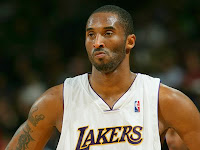
My hatred for Kobe & the Lakers goes past that of your traditional rivalry. Yes, Portland and Los Angeles are cities on the west coast, and yes, I'm still a little sensitive 10 years after the most soul crushing quarter of basketball I've ever witnessed. But my distaste towards Kobe is not rooted in his Blazer-killing past or his geography. My animosity towards Bryant transcends sport and has more to do with his off the court persona than it does his play in the arena.
I hate the way Kobe smirks after every basket. I hate the way he talks trash even when no one is listening. I hate his 100% bullsh*t, sugar-coated post-game interviews. I hate how he tries so hard to be like the legends. I even hate the way he throws a towel into an old lady's face (okay, maybe not the last one). In general, I disagree with his flamboyant and disrespectful approach to the game of basketball.
 It didn't have to be this way. I love the game of basketball, and I love to see the game played skillfully and gracefully. Because of this I can't help but recognize and admire Kobe's masterful performances on a basketball court. Kobe is a force - a deadly shooter, intelligent, playmaker, vicious finisher and 4th quarter closer all wrapped up in one player. In fact, at one time, Kobe had the tools to be not only a great player, but the icon of a generation - my generation. He's articulate, handsome, clutch, high-flying and a winner.
It didn't have to be this way. I love the game of basketball, and I love to see the game played skillfully and gracefully. Because of this I can't help but recognize and admire Kobe's masterful performances on a basketball court. Kobe is a force - a deadly shooter, intelligent, playmaker, vicious finisher and 4th quarter closer all wrapped up in one player. In fact, at one time, Kobe had the tools to be not only a great player, but the icon of a generation - my generation. He's articulate, handsome, clutch, high-flying and a winner.
But somewhere along the way, something went wrong. Despite 4 championships, 1 Regular-Season MVP, 1 Finals MVP and 11 All-Star appearances, the legacy of Kobe Bryant still remains clouded. Where is his place in the history of the game? How will he be remembered? Players and fans around the NBA have a tremendous respect for Bryant, but there are still just as many Kobe haters as there are fans of #24. The truth is, Bryant is one of the most polarizing figures in the NBA, if not all of sports. To figure out why, one must trace Kobe's path from a dusty gym in Ardmore, Pennsylvania in 1995 all the way to a champagne soaked locker room in the Staples Center in June 2009.
Part II Coming Soon
Monday, June 1, 2009
Lebron & The Cavs: A Look Into the Crystal Ball
Less than 2 weeks ago, the 2008-09 Cavaliers appeared to have all the ingredients for success. They had the star player (All-Galaxy MVP LeBron James), the strategy (Coach of the Year Mike Brown), the sidekick (All-Star Mo Williams) and the role players (Delonte West, Anderson Varejao and Joe Smith, to name a few). They also had the backing of an entire city, a 66-16 regular season record and first and second round sweeps in the playoffs. While Kobe Bryant and the Lakers seemed to pose a threat in The Finals, the Cavs were a lock to breeze through the Eastern Conference for their date with destiny (and Kobe). Right? Think again. Nike can finally trash the puppets, once and for all (at least until next season).
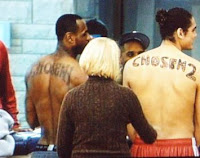 The Cavs must now face the reality that they find themselves sitting at home thinking of what could have been. The culprit for their early exit? A number of things which any analyst could blab about for weeks: the dominance of Dwight Howard, the versatility of Rashard Lewis and Hedo Turkoglu and the disappearance of (No) Mo Williams are just a few. But I am not writing about LeBron & Co. to reminisce on what could have been. I'm instead exploring what they still can be.
The Cavs must now face the reality that they find themselves sitting at home thinking of what could have been. The culprit for their early exit? A number of things which any analyst could blab about for weeks: the dominance of Dwight Howard, the versatility of Rashard Lewis and Hedo Turkoglu and the disappearance of (No) Mo Williams are just a few. But I am not writing about LeBron & Co. to reminisce on what could have been. I'm instead exploring what they still can be.The three most important questions facing the Cavs for next season and beyond are: 1) How do we re-sign LeBron James? 2) What in the world can we do to re-sign LeBron James? and 3) Holy crap what the f*ck are we gonna do if we don't re-sign LeBron James? And though LeBron says the Cavs' playoff exit won't affect his future with the team, we all know a championship is the ultimate solution for any dysfunction within the franchise. In other words, championships are the duct tape of the pro-sports world. Any problem plaguing your franchise (financial, moral, etc.) will disappear when your team wins it all. And for the Cavs, this has yet to happen.
So, what now? Has this year's heartbreak all but punched LeBron's ticket out of Cleveland? Or is this latest defeat only more fuel on the fire that is LeBron James' competitive spirit?
There is ample evidence to suggest that Cavalier fans can back away from that cliff, and put down the sharp object. The Cavs are in as good of a position to retain LeBron as ever, if for only one reason: Cleveland still remains the perfect setting for LeBron to cement his place as one of the most revered players in the history of the NBA.
LeBron and the MJ Factor
It is impossible to deny the fact that Michael Jordan has had a tremendous effect on the world of professional basketball. But it is also safe to say that no group of players has been so greatly affected by His Airness as the elite ballers in the league today. During Jordan's glory years (1990 to 1998), LeBron and his peers (Dwyane Wade, Kobe Bryant, Carmelo Anthony etc.) were at the age when you really begin to appreciate, and imitate, professional athletes. LeBron (who was aged 6 to 14 during Jordan's 6 championships) falls into this group of players who couldn't help but grow up idolizing Jordan's game-winners, high flying dunks and clutch playoff performances. LeBron wears #23 and Nike sneakers. Coincidence?
 But the most impressive aspect of Jordan's career wasn't simply his ability to win. It was his singular dominance of what appeared to be a team-oriented sport, where a great team is always supposed to prevail against a great player. Sure, Jordan had a great coach in Phil Jackson and a Hall of Fame teammate in Scottie Pippen. But what people remember most about the Chicago Bulls of the 90s is Jordan's dominance. Jordan not only won 6 MVPs, but he was also named Finals MVP during every championship run. To put it simply, the Bulls were Jordan's team, and the NBA was Jordan’s league.
But the most impressive aspect of Jordan's career wasn't simply his ability to win. It was his singular dominance of what appeared to be a team-oriented sport, where a great team is always supposed to prevail against a great player. Sure, Jordan had a great coach in Phil Jackson and a Hall of Fame teammate in Scottie Pippen. But what people remember most about the Chicago Bulls of the 90s is Jordan's dominance. Jordan not only won 6 MVPs, but he was also named Finals MVP during every championship run. To put it simply, the Bulls were Jordan's team, and the NBA was Jordan’s league.Flash forward to 2009. With visions of MJ flashing in their heads, how could the top players of today not want to win like Mike? Yes, they know they need successful offensive and defensive schemes, a savvy front office and blue collar players to win it all. But they want a team built around them so that they (like Jordan) can be the toast of the league.
Why is this relevant to The Chosen One’s future? Because Cleveland presents LeBron James with the perfect chance to write his own Jordan-esque narrative. Not only are the Cavs LeBron James' team, but Cleveland is LeBron’s city. LeBron grew up and played high school ball in nearby Akron, and many Clevelanders joke today that their economy is based around The King’s presence in their city. However, such a statement may not be far from the truth.
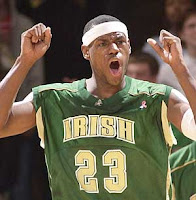 This rust-belt city (nicknamed the Mistake on the Lake) needs a hero, a phoenix to rise from the ashes of more than forty years of pro sports fruitlessness. And LeBron James fills that role better than any player ever will. And while the bright lights of New York, Los Angeles and Miami might beckon, LeBron could never create a legacy in those cities like he can back in Ohio. All those locales have already seen all-time sports legends pass through their doors (Ruth in N.Y, Magic in L.A. and Marino in Miami to start).
This rust-belt city (nicknamed the Mistake on the Lake) needs a hero, a phoenix to rise from the ashes of more than forty years of pro sports fruitlessness. And LeBron James fills that role better than any player ever will. And while the bright lights of New York, Los Angeles and Miami might beckon, LeBron could never create a legacy in those cities like he can back in Ohio. All those locales have already seen all-time sports legends pass through their doors (Ruth in N.Y, Magic in L.A. and Marino in Miami to start).The King may seem a little moody lately, and his allegiances may sometimes be questioned. And even the most stubborn Clevelander can admit that Shaker Heights is not Hollywood or South Beach. But when it’s all said and done, LeBron recognizes the fact that his legend can only reach its full potential if he stays in Cleveland to finish what he has started. And at 24 years-old and entering his 7th season in the league, he still has plenty of time to write his storybook ending. The city of Cleveland may witness something special after all.

Friday, May 29, 2009
To Blake or not to Blake?
1) There is an (ever decreasing) army of supporters of the Spanish Armada, a.k.a. those who feel that Sergio Rodriguez has what it takes to be our point guard of the future
2) There are those who feel Jerryd Bayless will eventually provide a solution at the 1 guard for the team
3) There are those who feel that Portland's best chance at improving at the point would be to acquire a "big name" point from another team through free agency or trade (Ramon Sessions, Mike Conley, Jason Kidd, Steve Nash etc.)
4) Lastly but most importantly there is the deafening roar of Blazer supporters who want anyone running the point but Steve Blake. ANYONE. ANYONE.
You may notice a potential group missing from this list: those who still support Blake as our starter for next season. Yes, I know there are a few of you out there who still love Steve, and that you have had to fight hard to defend Blakey after a couple of questionable late-game decisions in the Houston series. But I am discounting your opinion because your support is mostly rooted in the fact that you feel like, if you had practiced just a little harder, worked on your jumper, done those dribbling drills and made Varsity Junior Year, you could have been Steve Blake. Let the dream die. For every one's sake.
But back to the point guard dilemma. All 4 of these groups have semi-legitimate evidence to back up their argument. Sergio supporters can brag about El Chacho’s improved jumper and decision making, as well as his projected stats (8.4 assists per 36 minutes ain't shabby). Jerryd supporters can point to his impressive athleticism, frightening facial expressions, age (he's only 20) and YouTube greatness (here and here if you're skeptical). Those in favor of big names can tout the fact that the majority of championship teams in the past decade have had stars at the 1 (Parker in San Antonio and Billups in Detroit are the most prominent examples). And the anti-Blake crowd can point to Aaron Brooks' explosion in the Houston series as well as some embarrassing ankle breakers.
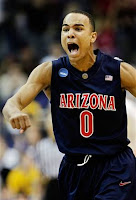 In the end, I think how you view the point guard dilemma comes down to perspective, mainly on what you thought was the downfall of the Blazers last season. When the home team favorites rolled over, there were a host of interpretations as to why the "team that no one wanted to play" quickly became an afterthought in the postseason.
In the end, I think how you view the point guard dilemma comes down to perspective, mainly on what you thought was the downfall of the Blazers last season. When the home team favorites rolled over, there were a host of interpretations as to why the "team that no one wanted to play" quickly became an afterthought in the postseason.Some blamed the team's defense, saying that their inability to clamp down when it mattered most cost them the season. Many fans attribute Portland's failure to the shortcomings of Brandon Roy's supporting cast, with most of the criticisms centered on Travis Outlaw and LaMarcus Aldridge. Others simply blamed the Blazer's youth and playoff in experience. Some blamed the refs. Get over it already, the refs suck and we know it. There's no need to chant it. Or write a letter to David Stern. We get it.
 We all know there was no one single factor that led to Portland's ousting. And that's why this debate will rage on until the Blazers tip off next fall, and why I can't really side with any one group in this dispute. But I do urge Blake Haters to recognize one fact: basketball is a team sport, and teams thrive and die as a unit. One man does not win a playoff series and one man does not lose a playoff series. So cut Steve Blake some slack. He's not going to have a signature shoe, and he may not fit the prototype of a championship point guard. But he filled an important role for Portland this season, and while he may never resume his starting duties, he could be the least recognized Blazer whose play leads to success for the young core of this team down the road.
We all know there was no one single factor that led to Portland's ousting. And that's why this debate will rage on until the Blazers tip off next fall, and why I can't really side with any one group in this dispute. But I do urge Blake Haters to recognize one fact: basketball is a team sport, and teams thrive and die as a unit. One man does not win a playoff series and one man does not lose a playoff series. So cut Steve Blake some slack. He's not going to have a signature shoe, and he may not fit the prototype of a championship point guard. But he filled an important role for Portland this season, and while he may never resume his starting duties, he could be the least recognized Blazer whose play leads to success for the young core of this team down the road.
"I've never seen him play like this. Makes me very angry, because I always thought that he was the guy we should've kept. That was a money contract year. And watching him now making 45 percent of his threes, that was the only weakness I thought he had when we had him, was would he ever become a great 3-point shooter, and he would fit perfectly with our team."
-George Karl, Coach of the Denver Nuggets, on Steve Blake's 08-09 season
